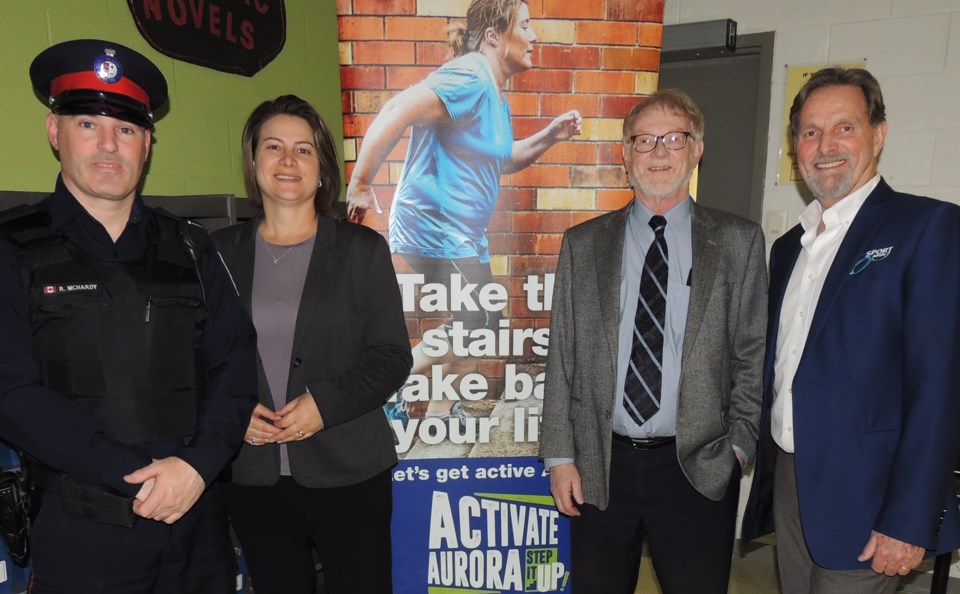This article is written by Neil Moore, director of communications, Activate Aurora/Sport Aurora, 905.717.7474, [email protected].
Parents and educators gathered at Aurora’s Rick Hansen Public School to hear from the experts and start a discussion that was as much about safety and healthy living, as it was about regaining lost freedom for children.
The meeting was focused on the idea of creating a “free-range” community for children. Not necessarily by turning back the clock, but by creating an environment where kids can experience and explore through unstructured play — which has withered to short, outcome-based sessions, focused on skill development, and is safe, non-adventurous and offers little or no risk.
And according to Brandy Tanenbaum of the Centre for Injury Prevention at Sunnybrook Health Sciences Centre, this kind of play is contrary to growing evidence about the importance of risk competence in developing resilient children who will succeed later in life.
“The leading risk factor for injury in children is being a child,” she continued. “Leaders think they’re making the best decisions to protect our children, but when they do, they create other unintended consequences.”
Tanenbaum asked the audience why play is so important, and followed with a quote from Fred Rogers: “Play is often talked about as if it were a relief from serious learning. But for children, play is serious learning. Play is really the work of childhood.”
Although the adult mind may not consider it purposeful, she pointed out that the skills children foster during this time are fundamental to development.
“Children who play are more self-regulated, co-operative, considerate, friendly, and more socially competent.”
She also introduced the concept of “safety-creep,” demonstrating how a litigious, overprotective culture has, over time, stripped playgrounds and public spaces of any risky elements — and fun.
“Children want to play in the way they want to play — the way many of us had the opportunity to do when we were younger.”
Despite most parents not only surviving but thriving without sanitized environments and adult supervision, many still perceive threat. Statistics, however, show that a greater number of children are injured falling out of bed versus falling from trees.
“And yet, we don’t call for a ban on household furniture.”
That being said, Tanenbaum is serious about preventing life-altering injuries. Bumps, cuts, scrapes and bruises, on the other hand, “are learning opportunities.”
“We need children to experience risk in low doses and repeated exposures, so they can develop their confidence and competence,” she said, adding that as they reach their adolescent years and are hard-wired for riskier behaviour, they’ll be better prepared.
“We don’t want their first risk-taking experience to be in the front seat of a car.”
Perhaps the even larger issue in avoiding regular, robust activity is in terms of health outcomes. Dr. Richard Gould, York Region’s Associate Medical Officer of Health, spoke about physical literacy and fitness, and how it affects everything from type 2 diabetes to bone mass, as osteoporosis may become an issue later in life.
“Activities like running, jumping, skipping, tumbling, and anything that has an impact are important,” he added. “Peak bone density is set at an early age.”
Other benefits of physical activity and free play, he noted, are improved cognition (attention, memory, learning, problem solving), social skills, and an improved ability to assess risks.
According to the 2018 ParticipACTION report card, only 35 per cent of five to 17-year-olds are reaching the recommended physical activity levels outlined in the Canadian 24-Hour Movement Guidelines. One of the solutions, he adds “is to increase active travel — walking and cycling to and from school, visiting friends, running errands, walking rather than driving to the park, and building increased activity into the child’s day so they are reaching that 60 minutes.”
The evening’s last speaker, Const. McHardy of the York Regional Police Community Engagement and Well-Being Unit, admitted that during his 20 years as a police officer he has seen “the underbelly of the beast".
"But as I say that, I tell you the world is actually a good place.”
He noted that York Region is ranked 30th out of 229 communities across the country regarding safety. “York Region is a very safe community.”
McHardy also acknowledged that despite statistics, “Something can still happen. So we want children to go out into the community, but to be equipped with good information so there is a level of self protection.”
He continued his presentation with a checklist of practical, common-sense tips that touched upon everything from headphones and devices, to letting family members know your destination — and return time.
“The No. 1 thing is to be aware of your surroundings. If something looks out of the ordinary, pay attention. Trust your instincts, listen to your gut.”
The evening wrapped up with the expert panel responding to parent and teacher questions, and a final challenge from Ron Weese, Chair of Activate Aurora, which is to begin this journey by becoming involved in community activism.
“Changing the behaviour of a neighbourhood and creating an inclusive, safe and play-friendly environment for kids requires all parents to be involved,” he observed. “It truly takes a neighbourhood to raise a child."



